| Deltarian Culture | |||||||||||||||||||||||||||||||||||||
|---|---|---|---|---|---|---|---|---|---|---|---|---|---|---|---|---|---|---|---|---|---|---|---|---|---|---|---|---|---|---|---|---|---|---|---|---|---|
| |||||||||||||||||||||||||||||||||||||
As a rich and diverse melting-pot of language and ethnicity, Deltarian varies slightly from region to region. After the great reformation, gender roles in Deltaria changed radically from their previous state. Female Equality came into affect, with job discrimination prohibited by the government. Life in the countryside is usually very similar day to day. The farmers are usually either leased land by the companies owning them, paying both in money and their produce, or own their own land. Women are expected to maintain their virginity and live with their family until they are married, and women who fall pregnant outside of wedlock are usually shunned. Men who do choose to leave their farming life leave the family home after their formal education, or alternatively in their early twenties, and usually try to go work in a large city . Those who remain in the towns try to either start up commercial ventures, make larger agricultural businesses, or try to formally work in one of the large agricultural companies.
In the towns and cities, life is more cosmopolitan and hectic. Industry is generally kept to the outskirts of cities, known as the "belts", and here make goods for the commercial areas from the raw materials coming in, while those in the city centers usually make their living from commerce and trade, or providing services. Noble life consists largely of managing the land and huskarle, and attending social events such as dances, banquets, and sporting events such as organised pig hunts and equestrian trials.
Art[]
Visual Arts[]
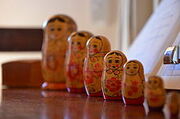
Famous Deltarian Matryoshka Dolls.
As a largely agrarian society before the Czars tried to industrialize the country , Deltarians still are tied to their surroundings despite more and more emigrating to the cities, which manifests heavily in arts and crafts. The international market for Deltarian art ; which has a larger than expected demand, due to Deltaria's exotic and mysterious culture, is generally supplied by factory producers, so authentic folk art actually created in Deltarian towns is created solely for the decoration of Deltarian households in the towns and cities, and each item remains unique, fetching high prices among collectors. Traditionally used elements in crafts are wood and paint from plants. These materials were also used before the Great Reformation to make houses, but now houses are usually made of brick, wood, stucko, and other materials. A popular activity amongst the city dwellers is similar to rural craftmaking, but using more advanced materials and ideas.
Higher Arts[]
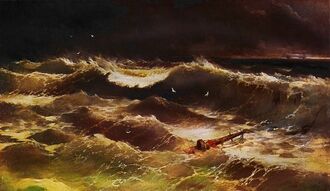
The "Terrible Storm" by Ivan Aivazovsky is one of the most expensive painting on the market.
Deltarians with the talent to pursue higher art are usually born in the cities, and go to the fine art colleges. A popular idea amongst some artists is to model after the old Czarist style, while other work on more impressionistic work highlight this. The harsh beauty of the Deltarian Landscape is another widely explored theme, while other paintings either display the vibrant city life, and other the beautiful architecture. Another popular theme of Deltarian paintings are scenes of battle before and during the Czarist Era. There have been many prolific artists in Deltaria, such as the famed Ivan Aivazovsky I, who created many great cityscape, seascape and landscape paintings. He was born in Ushalande, an area widely influenced by the sea, and took inspiration from it. Thus he is widely considered to be one of the greatest seascape painters of all time.
Music[]
Folk Music[]
The art of voice and movement often accompany daily activities of the common Deltarian people. During the harvests, Deltarian women are often heard on the fields, singing the songs of their loved ones, making the long hours of tedious and mindless work pass quicker. The majority of Deltarian folk songs are performed this way, unaccompanied, out in the fields. However, at village gatherings, the more musically talented men take up their crude instruments to form folk bands. Common instruments are the three-stringed balalaika, a huge shepherd's flute known as the Deljara, and Deltarian bagpipes, all of which were usually played solo. Ensemble groups typically consist of violins, double bass and cymbalum.
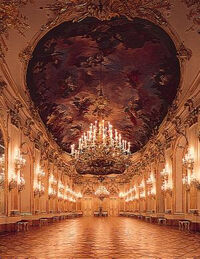
Deltarian theatre
Classical Deltarian Music[]
Educated musicians in Deltaria strive to achieve more sophisticated and elegant pieces of music than their rustic counterparts, utilizing mainstream Artanian instruments to create operas, symphonies, ballets and waltzes. Music is usually enjoyed by the nobles as a social event, either dancing lively waltzes at festive ballroom events, or attending theatrical performances of symphony orchestras or operatic troupes.
Talented composers and performers of High Deltarian music are respected by the upper classes of Deltarian society, whether they are of noble or common blood; and some of their works have achieved widespread popularity across the face of Terra, earning international recognition for Deltarian artistic achievement.
Below is a small selection of High Deltarian music, including the ever-popular Deltarian waltz. The media is in .ogg format.
- The High Deltarian Waltz, a ballroom waltz popular among Deltarian nobles.
- The Nocturne of Darali, a haunting piano and violin nocturne.
- The Great Battle, a stirring overture to the Great Deltarian Landing.
Films and Plays[]
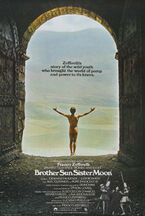
A poster for the early film "Saint George" by Brother Sun, Sister Moon productions.
Early Deltarian filmmaking is well regarded for it's unique perspective on the life of children in the world. It is still famous for depicting the lives and struggles of everyday people, although other movie genres are also popular, such as action films or mystery films. Some have even achieved critical acclaim on the international stage. One example is the critically acclaimed "Saint George", a movie depicting the life of the Deltarian patron saint. Deltaria is still very religious, with many following the Terran Patriarchal Church, or another branch of Hosianism. Thus religious movies are popular as well, allowing for great national love of the movie "Saint George". It was admired by international critics as not being too much about the religious life of Saint George Menkask, but instead focused on his struggles with family, the Trinity, sins and his general life, without trying to impose Patriarchalism on the viewers. Other genres are also popular, such as comedy or romance.
Plays are also fairly popular amongst many in the cities and countryside as well. Much influence in plays comes from the neighboring Watuni Republic, which created many plays and theatre. There is influence from them in Deltarian Theatre, and thus many plays focus on philosophical trouble, drama, tragedy, and comedy. These themes allow for a still popular and successful theatre industry, with some playwrights still in high demand in some places.
Literature[]
Despite having a notable shortcoming in vocabulary, with the Delic tongues containing far less words than most outside languages, Deltaria has produced some outstanding literary works, and boasts several of the worlds most acclaimed 20th century authors ; arguably the two greatest novelists of the 20th century were both Deltarian. Deltarian literature is generally deeply emotional, concentrating more on feelings than thoughts, but tempered with the morbid fatalism so ingrained in the Deltarian mindset, which has brought justified criticism that Deltarian works are difficult for the non-Deltarian psyche to fully appreciate. Suffering, both as a mechanism of evil and as a path to redemption, is heavily recurring theme in Delic literature, along with explorations of guilt, remorse, joy, pride, and heavy focus on Hosianism and Hosian symbolism. The Doron Akigan golden age of literature passed long before that of other cultures in the nation, and focused heavily on ballads and epic poetry, most of which are considered archaic and irrelevant to modern times. Literature originating from Ushalande and Dissuwa is far less recognised in the outside world, but should not be overlooked completely. The more modern Ushalandan and Dissuwan literature has a far more Artanian quality to it, but is often criticized as keeping the morbid and fatalistic nature of Delic works, without the deeper emotional explorations that provide a necessary juxtaposition to Deltarian themes.
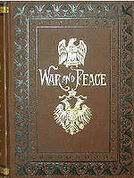
War and Peace by Leon Tolstov.
Famous literary works usually focus on nature, which is stunning in Deltaria, or short fiction, the dominant genre. One famous writer was Leon Tolstov, a great writer who made a book called "War and Peace", a great work read in most colleges across the world. War and Peace is one of the largest novels in the world, and centers around five aristocratic families during The Terror. Tolstov is regarded by many to be one of Terra's great writers, and a great novelist and maker of realist fiction. Another great writer was Anton Checkhoy, who is considered to be one of the greatest writers of short stories in history. He was extremely eloquent, and also dabbled in plays or other works.
Sport[]
Sport in Deltaria is primarily the domain of the noblemen, who use it as a social outlet, a way of keeping fit, and a basis for gambling. The common classes generally have little time or energy for sporting activities, but the peasant classes have access to several sports designed solely for gambling, usually of a combative nature between two men. Bareknuckled boxing matches, or purse fighting is a common recreational event, as well as sports based on grappling and contests of strength.
Team sports are almost unheard of in Deltaria, but smaller peasant boys often occupy their free time playing a game similar to association football, albeit without any defined rules or scoring. Girls are discouraged from such rough play, and encouraged to keep to their crafts activities.
Chess[]
Chess is an abstract strategy board game for two players. The object of the game is to checkmate the opponent's Czár, which involves moving ones pieces into a position that directly threatens it. In Deltaria, chess is considered a sport ; and referring to it as a game meets with strong disapproval, and sometimes even violence. Deltarians vehemently insist that they are the inventors of chess, although historians are in general consensus that the game originated in central Seleya.
Nobles in Deltaria are expected to have at least a simple grasp on the strategies of chess, and are schooled from early childhood, and chess-playing remains an important social activity, and a commonly-used setting for important discussions of state between two nobles. Some have achieved mastery of the game, and the grand masters of chess have turned it into a spectator sport, introducing crowd-drawing playing blindfolded, playing multiple games at once, and using complex and new varients on the game.
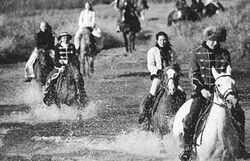
A Deltarian hunt
Hunting and Marksmanship[]
The most popular outdoor activity for noblemen is the hunting of game, including kangaroo, cassowary, wild pigs, and animals introduced solely for the purpose of hunting, such as deer, pheasant, rabbit and fox. The endangered animals of Deltaria make for the most valued and prestigious trophies, although opportunity becomes rarer and rarer with each passing year. Hunting is generally done on horseback, with the use of scenthounds or sighthounds. Hunting weapons usually consist of rifles, shotguns and pistols ; which are technically illegal, but never prosecuted amongst nobles. Crossbow and longbow hunting is less widespread, but still a popular method, and some of the most daring nobles prefer to hunt the savage and deadly wild pigs on foot, with nothing but a pack of sighthounds for tracking and cornering the animal, and a bowie knife to make the kill. Several noblemen have died partaking in this dangerous practise.
Marksmenship events are also common, from fixed target shooting with anything from longbows to scoped sniper rifles, to skeet shooting. Where a group of Artanian businessmen might discuss practical matters over nine holes of golf, Deltarian nobles are far more likely to conduct the same manner of conversation with shotguns crooked in their arms and clay pidgeons flying overhead.
Equestrian Events[]
Equestrian is an integral part of noble life, and makes for a large variety of Deltarian sporting events. While horse-racing is popular outside Deltaria, it is spurned as pedestrian and common by the nobles, who favour displays of high training and horsemanship, such as competative dressage, reining, show jumping and judged equitation. By far the oldest of Deltarian equestrian sports is the joust, a martial competition between two nobles. The competitors face each other along a short horse run, named a tiltyard, equipped with armour, helmet, lance and horse, with the object of the competition being to unhorse ones opponant. In the event of both or neither man being unhorsed, the winner is declared based on whose lance is most extensivly broken, signifying a harder hit. In pre-Republican times, the favoured jousting horse was a heavy destrier, a warhorse. Competitors would wear light chain armour, with bolted plate cuirass and greathelm, and competitions were either pre radost, using a blunted lance, or pre smrt, using a sharpened war lance. Jousting pre smrt usually resulted in death. In recent times, jousters now use smaller, more agile chargers, and the protective armour has been replaced by modern synthetic fibres such as kevlar. Jousting pre smrt is no longer an accepted practise.

Bear baiting in southern Alazinder
Animal Bloodsport[]
Deltarian bloodsports consist of setting two or more trained animals against each other for the purposes of recreation and gambling. The most common bloodsport is the dogfight, in which two large fighting dogs, generally Deltarian Bull Mastiffs, are aggravated and placed in small pits, where they fight to the death in front of an audience. Injuries leading to the death of the winner are not uncommon, and the sport has been harshly criticised as cruel and immoral outside of Deltaria. Another popular bloodsport is coursing, a practise in which a small herbivorous animal, generally a hare or rabbit, is released with two or more sighthounds in pursuit. Wagers are often taken on the outcome of the chase, with odds generally around 2:5 in favour of the hare.
Although less common, the official national sport in Deltaria is bear baiting. Bear baiting consists of one or more mastiffs being set on a chained Artanian bear, with the goal of attaching themselves to the bears snout and holding on for as long as possible. Specially constructed arenas, known as bear-gardens, exist in all large Deltarian cities, and freeman animal trainers maintain large herds of bear and dogs especially bred for the practise. Aside from the large revenue made by book-keepers, admission prices and stud fees also add to the value of this lucrative event.
Cuisine[]
Food in Deltaria is dominated by wheat, meat, and dairy products, with fruit and vegetables to bolster the meal.
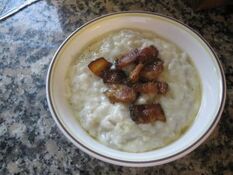
Traditional Cousine varies from region to region, but the national dish is bryndzové halušky, a meal made up of flour and potato dumplings, salty sheeps feta and bacon. Deltarians generally eat a small breakfast and dinner, lunch being the largest meal of the day. Soup is a Deltarian staple, eaten either cold or warm it always makes up an integral part of the Deltarian lunch, followed by a second, heartier course.
Deltarian meals are generally made with potato, cabbage, lentils, and some meats include pork, beef, goat and fish. Meals are ussually larger in the countryside, but are more diverse and balanced in the cities.
Ushalandan Cuisine[]
Ushalandan cuisine is diverse, blending the dishes of the several traditions which it has come into contact with, as well as maintaining its own character. It has been greatly influenced by Deltarian Delic cuisine but also includes influences from the cuisines of other neighbours, such as Jelbeks, Akigans, and Selucians. One of the most common dishes is мъмълига (mămăliga), a cornmeal mush, which after time became enhanced with many spices and ingredients. Pork is the main meat used in Ushalandan cuisine, but beef is also consumed, and a good lamb or fish dish is never to be refused.
Dissuwan Cuisine[]
Dissuwan food is often spicy, using paprika, black pepper and onions. Potatoes are also commonly used in many dishes. Dissuwans are passionate about their soups, desserts and stuffed pancakes, with fierce rivalries between regional variations of the same dish. The vast cattle stations on the plains of Dissuwa have given rise to some innovative 'Doron-style' cheeses such as hvarti and Doron feta, imitated around the world. In Dissuwa, breakfast may consist of bread, fruit, vegetables, or eggs. Lunch is the major meal of the day, with several small courses: soup is followed by a main dish, preferably including meat and dairy, which precedes a dessert. Fruit may follow. Dinner is a far less significant meal than lunch.
Doron and Akigan Cuisine[]
The cuisine of Doron Akigo is traditionally heavy and rich in fat, consisting mainly of carbohydrates, dairy products, meat and fish. Doron Akigans have a reputation for deeply appreciating rich, unhealthy foods, and a well-known quip states that the only time one is likely to see a Doron wielding a knife is when he has a fork in the other hand. This has allowed for a burgeoning fast food indutry in Doron Akigo. Although famously progressive within Deltaria in respect to social values, Doron Akigans are fairly conservative when it comes to food. They thus appreciate traditional cooking, and are hesitant to embrace new "different" types of food.
Deltarian Major Holidays[]
Arms Day[]
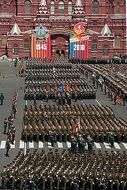
Army on parade on Arms Day outside a Czarist-style Building
In Deltaria Arms Day is the day dedicated to the veterans and soldiers of the country. Deltarian has a long history of conflict, and thus this is a very important holiday in Deltarian culture. Parades are held for the military, with many festivities and celebrations during the day. In the evening, however, the celebration stops for the honouring of the dead soldiers. For those who wish it services are held, and for the rest of the day the country is in mourning. There is no school on Arms Day, but on the days leading up to it classes and activities are held in schools, usually for learning about military or Deltarian History.
Spring Day[]
Spring Day is a spring festival celebrated in Deltaria on the 1st of Spetember. It marks the beginning of the New Year on the Pagan Calendar, and the signifigance of the date still holds in Deltaria. Celebrations are put on usually at schools for the day, with some school children being taught about the seasons or the orbit of the earth, etc.
Festivity of Descent[]
The Festivity of Descent, referred to as The Great Night in Deltaria, is the first of the Deltarian autumn holidays.

A Deltarian boy and girl during the Feast of Descent
The advent of the Festivity of Descent is cause for excitement in Deltaria, and preparations are made weeks in advance. Boys create small whips from braided willow branches, while women and young girls cake cake and decorate eggs. Most use paint alone, but the more artistic girls often add wax and hay to create tactile decorations.
On Descent Monday, boys attempt to surprise the girls with playful whippings and the throwing of buckets of water over them. While considered barbaric and sexist by the outside world, the manner of the whipping causes little pain, and is a deeply ingrained Deltarian tradition. Deltarians respond to criticism with claims that eating chocolate on the Feast of Descent is an inappropriate manner of honouring Eliyahu's Second Exile into Hell.
After the whippings, cake and strong Deltarian spirits are shared, and girls can give handmade Descent eggs to the boys they really like, sometimes removing the ribbons from their braids to attach to the boy's whips. After the initial festivities, Mass is performed at the local church ; and most villagers attend.
All Saints and All Souls[]
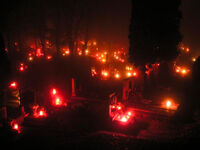
All Souls in Darali
All Saints on 1 November in Deltaria is a day celebrated in honour of the saints. It is closely related to All Souls which follows on 2 November, a sombre celebration in which Deltarians revere and honour their dead relatives, friends and ancestors. On this day, Deltarians set a place for the spirits of the dead at their lunch table. In the evenings, Deltarians travel to the cemeteries en masse, bringing flowers and candles to pray over the graves of their dead. All Souls night in Deltaria is a stunning sight, with thousands of candles flickering in the darkness.
Ivanka Kováčová Day[]
The 26th of March, Ivanka Kováčová Day, is a holiday dedicated to the memory of Ivanka Kováčová, the Heroine of Deltaria who fought in the Deltarian-Lodamese War. Although considered a war criminal and mass murderer by people outside Deltaria, her memory is revered by the common folk, who have been taught she was a patriot and saviour of the nation. Some customs are borrowed from all souls day, such as the setting of an empty place for Ivanka during mealtimes, and the lighting of a candle ; although not in a cemetery, but in the mantleplace or windowsill of ones home. Deltarians are expected to spend at least several minutes in silent prayer to the memory of Ivanka Kováčová, which can sometimes extend to an hour or more amongst the more religiously fervent.
Festivity of Birth[]
The Festivity of Birth, called the First Night, is the last big holiday before the new year. It is celebrated as the birth of Eliyahu in the Terran Patriarchal Church. Most if not all Deltarians take part in the Festivity, even if they are not Hosians, as it is a time when gifts are exchanged between people. Festivities begin on the 24th, and follow throughout the night. A Pre-Festivity mass is prepared, while others may go out and celebrate in bars or at home. On the 25th gifts are exchanged, with most people staying at home and spending time with their loved ones. On the 26th a huge Mass is prepared, with many taking part. It is after this late night mass that the Festivity officially ends.
Deltarian Architecture[]
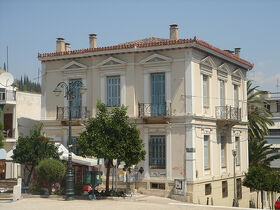
A good examp;e of the Imperial Style in an Ushlande Home.
After the Great Reformation, Deltarian houses of a rapidly wealthier populace modeled the old Czarist style of the more afluent. Each individual architectural style varies slightly from region to region, but houses usually are made with bright colours such as reds, pinks, oranges, or other 'warm' colours, as well as whites. Rooms usually have high ceilings and many windows. Houses are very 'open' and individual rooms are usually large. Wood, brick, tiles, stucko, and other materials are usually used for walls, which are usually painted. Naurally tropical houses would be more open than southern houses, but they too have many windows and high ceilings, even if the doors and windows are closed. These houses generally all mirrored the Czarist Imperial style (OOC: Neoclassical), which tried to mirror the collums and other styles of classical areas like old Kalopia. Modern buildings are also present in all of Deltaria, and usually incorporate blues and greys, as well as large windows.
Opera, Ballet, and Music[]
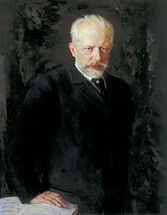
Peter Tchaikovskys, a famous Deltarian Composer
Deltaria is famous for it's musicand opera, hosting some of the most precocious and prolific musicians and composers in Majatra. During the Czarist Period and beforehand classical music was extremely popular, with world famous composers like Pytor Tchaikovskys being natives of Deltaria. Pytor was very influenced by the events around him, such as the conditions of the are and people during the Five Nations period, and from that wrote much music. He was in very high demand at the courts of nobles of the time, and even preformed at the court of the the Emperor of Ushlande, probably the single most powerful man in the Deltarian area at that time. He also was famous for composing one of the most famous ballets of all time: The Swan Princess. This was probably his most famous ballet, but he also made other great ballets and operas such as "The Nutcracker". Both of these ballets are still extremely popular in Deltaria and Terra-wide.
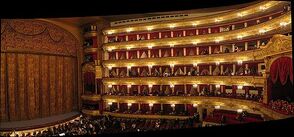
The Beloski Theatre
Another famous composer and opera playwright was Richard Beloski, a prolific composer most famous for his writing of the opera "krúžok", known as "The Ring", in english. Beloski was born during the time of the Czars, and was heavily influenced by the events at that time as well as his relationship with his wife. Opera was a major part of Deltarian High Life, with everyone who was anyone attending the opera. The importance and love of opera still exists in Deltaria today, with opera houses all around Deltarian and in major cities playing great epics. The most famous oera house in Deltaria is probably the Beloski Theatre, named after the prolific composer, and was built for the Czar himself originally. Today it is very famous, with many coming as tourists and locals alike to see the shows put on there. In modern times newer, conventional kinds of music are also popular in Deltaria. Jazz never really caught on with the people, but now many listen to rock music, pop music, and other genres.
Deltarian Customs[]
Burning the Mortitsa[]
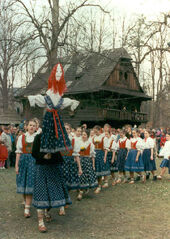
Girls carrying Mortitsa out of the village
On the last day of August, the Deltarians celebrate the end of winter, which in the Terran Patriarchal Church is said to be ruled over by the Demon-Goddess Mortitsa. Mortitsa symbolizes winter, sickness and death. Although winters in Deltaria are notably mild, the tradition has carried on from Artanian Deltarians.
Peasants make an effigy of the Mortitsa out of hay, and dressed in traditional folk clothes. This effigy is then attached to a stick and lifted into the air. Usually girls carry her while singing to symbolize carrying Winter out of the village, followed by a large crowd of villagers. The effigy is taken to the nearest river, lake or well, where it is set on fire and thrown into the water. Young girls collect flowers and make daisy chains or flower wreaths out of them, to welcome in the spring.
Welcoming Traditions[]
The Deltarian peasantry pride themselves on hospitality, and have several rituals based around the welcoming of a guest into their homes. Shoes and boots are generally removed apon entering a Deltarian household, and house slippers are offered to the guest instead. The woman of the house, or the eldest daughter offers the guest a piece of bread with salt on an embroided cloth. The cloth and the bread are taken to symbolise life and health. It is customary that the guest receives the best treatment in the house, but showing disrespect towards his host is often punished extremely harshly. Several foreign visitors to the Deltarian countryside have made the mistake of taking the overwhelmingly servile Deltarian hospitality for granted, and have dragged out into the streets and hanged, or worse.
Deltarian Marriages[]
Deltarian peasant marriages are a consentual affair, unlike the arranged marriages of the nobles. Weddings in the Deltarian countryside are an event that bring the entire community together, and all residents of the village are personally invited by the bride or groom. Marriages always occur on a Saturday. Both families are expected to help with the preparations, especially the baking of cakes. Marriages between people from different villages always take place in the village of the bride, and the groom and his family are expected to walk to her village. A wooden gate is erected at the village limits, and several of the young men of the village wait for them. At this point, the bride must be purchased from the village, with gifts of slivovica, borovička and vodka.
When the groom reaches his bride-to-be's house, a veiled woman is sent to him, who is not his wife. In a custom symbolising his choice to love one woman, spurning all others, he must reject two such women, before his true love comes out to greet him. The bride sews a small flower onto the grooms wedding suit with a white thread, before the in-laws are introduced to one another. The bride and groom then kneel to take blessings from their parents and grandparents, and both families walk to the church on foot. A holy Mass is performed, before they are married by a Catholic priest, exchange rings, and kiss.
After the marriage, comes traditional celebration. A plate is broken, for good luck, and the bride and groom make a show of their compatibility and togetherness. The bride takes a broom and sweeps the shards, while the groom helps her and picks them up. Then he picks her up and carries her to their seats. Both of them welcome the wedding guests and are expected to personally share drinks with as many guests as possible. A meal is served, but the bride and groom have to drink from one large glass and eat from one large plate with just one spoon to prove their unity. The wedding dances start, playing traditional Deltarian music.

Deltarian wedding
First, the bride and groom dance together, with the entire congregation watching. Then all wedding guests surround them in circle and dance around them and two always with them. A chair with a hat is left the middle, where the guests throw donations for their future children and house. Later in the evening the bride’s friends or family kidnap her while the groom is not paying attention. The groom then has to go out into the night, searching for his bride and the wedding celebration goes on without them. Eventually he finds her drinking in one of the village pubs, or the house of one of the kidnappers, and they may all return to the party.
By this stage the bride and groom have changed out of their wedding clothes into traditional peasant apparel. At midnight, the villagers grab the bride, place a large bowl in front of her and hold a knife to her throat, threatening to cut off her head unless she removes her wedding bonnet. The bride is expected to refuse three times, symbolizing her love and devotion to her new husband. The pair get seated on two chairs and lifted into the air where they clink glasses and drink. Then the wedding continues until the early hours of the morning with a lot of drinking, dancing and singing.

